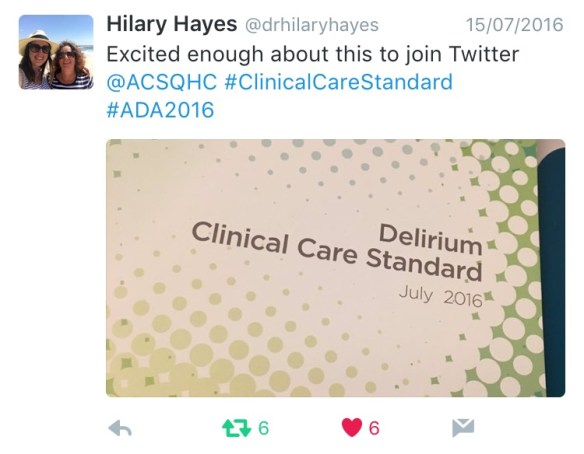Delirium is a common, distressing complication of life-limiting illness, yet poorly understood, often misdiagnosed and poorly managed. The Australian Commission on Safety and Quality in Health Care (ACSQHC) recently launched its Delirium Clinical Care Standard. I was fortunate to attend the official launch event on 15th July 2016 – the stand-out of which was the powerful story of Michael, as told by his wife Joan Jackman, who was Community Representative on the Delirium Clinical Care Standard Working Group.
She has kindly allowed me to reproduce her speech here and I hope it will spark discussion about delirium, what we can learn from Michael and Joan’s experience, and how we can do better.

Michael loved the Australian bush. Photo: Wayne Robinson
Michael’s story:
‘Every medical condition is about a person with an individual history, friends and family, and a personal story. The person in the centre of this story is my husband Michael – a healthy, fit, intelligent man – who had been a fitness trainer in the British Air Force before becoming a British-trained Remedial Gymnast in Rehabilitation, for people with a disability. He was an elite sportsman, with a love of life, and also for his family.
Around the age of fifty-nine or sixty, Michael began to experience changes, utmost being that he became increasingly disengaged –with us, and with life! Something was wrong! We sought help. After three misdiagnoses and six years, Michael was finally diagnosed with a Younger Onset Dementia. He was by then, 66 years old.
Eight years into the progression of his dementia, Michael had a temporary six month stay in Residential Aged Care. During this period, he had several admissions to acute hospital care.
The first admission followed a collapse, thought to be a stroke by the Residential Aged Care staff. On admission to the hospital Emergency Department, he was found to be in acute renal failure with severe urinary retention. The next night, he became extremely agitated and was trying to climb over the bed rails. No-one contacted us! Someone judged to give him five times his normal dose of risperidone (an antipsychotic sedative medication) to ‘quieten him down’. He was rendered unconscious for five days. At the end of a subsequent five week stay in Hospital, he was discharged – but had more noticeable changes in his cognitive capacities. He was now incontinent and required an indwelling catheter.
A month later, following another collapse in Residential Care, Michael was thought by the staff to be in kidney failure. They recommended palliative care. He was very quiet, unresponsive to us, and withdrawn – despite him being fine with us just the previous evening, prior to the fall. We asked for him to be taken straight to the Emergency Department of the local teaching hospital.
On arrival, his admission to ED was delayed by nearly an hour. Michael was still very quiet, not communicating, unfocussed and withdrawn. Attention was prioritised by the ED staff to new arrivals who were in a more agitated state. So…we waited!
When he was finally admitted, Michael was found to have severe urinary retention – as a result of a blocked catheter tube!
During the subsequent six-week admission, it was decided to undertake surgery to alleviate the necessity for his indwelling catheter, which he kept trying to remove, causing internal damage. Following the surgery, I asked to join him in the Post-Operative Unit – anticipating he would be frightened in the unfamiliar environment & with aspects of the post-surgical care – but I was not allowed in to be with him. The next morning on visiting, I found him tied by his wrists and ankles to the bed-rails, because of his extreme agitation and distress. The nurse sitting at the end of his bed, writing in the notes, picked up a roll of bandage, threw it at him, and said, ‘Here, play with this!’ The fear on his face was palpable!!
His final admission from Residential Care, a month later, followed an apparent fall which left him unable to mobilise. He was again very quiet, withdrawn, unresponsive. He was admitted to ED on our request and found to have two fractured ribs and an injured, swollen knee. In his immobile, uncommunicative and very unresponsive state, the attending Doctor described him as similar to someone with ‘Locked-In Syndrome’! After six weeks in the Acute Aged Care Unit, he was for discharge…But he had lost his mobility, had a compromised swallow reflex, further changes in cognition, and was considered to be “palliative”.
We brought Michael home to care for him ourselves – and that is where he died six months later.
For Michael, as a person with dementia, each of these acute hospital admissions was distressing, sometimes frightening for him, causing an exacerbation of his symptoms and the acceleration of his condition. No-one spoke with us about it at the time – or explained Michael’s sudden changes in behaviour – but it’s likely he was experiencing delirium. As I now know, people with dementia are at increased risk of developing delirium during a hospital admission!
With the introduction of this Delirium Clinical Care Standard, a person like Michael will now be immediately identified when presenting at hospital, as being at risk of delirium. He would be promptly assessed, in consultation with his family or carer, who would be asked about any recent changes in his behaviour or thinking; his diagnosis would be discussed with the patient & family; he would be offered interventions to either prevent delirium, or treat the causes of his delirium; his care would be based on reducing his risk of falls or further injuries; non-pharmacological drug strategies would be the prioritised approach to relieving his distress – including involving his family in this care; and at discharge the family would be involved in the development of an individualised care plan and provided with information about delirium, for ongoing care after leaving hospital.
This Delirium Clinical Care Standard will support consumers to know what health care should be offered for delirium – and they can expect to make informed decisions in partnership with their Clinicians.
This is their right, we know, as Australian Health Care Consumers.
The ACSQHC is to be congratulated for identifying delirium as a priority for the development of a National Clinical Care Standard and supporting this development with the establishment of a Delirium Clinical Care Standard Working Group, expertly chaired by A/Professor Gideon Caplan & co-chaired by Dr Judy McCrow, together with professional experts and consumers.
This Working Group was fortunate in being supported in its work by the ACSQHC’s hard-working staff.
As part of the ACSQHC’s ‘Caring for Cognitive Impairment’ Campaign, this Delirium Clinical Care Standard will support safe, high quality & appropriate care for people with, or at risk, of delirium.
CONGRATULATIONS and thank you to everyone involved, and not least of all, to my husband Michael – a courageous man who taught us so much about living with the impact of dementia – and importantly – about the special care needs of people with delirium.’
I can’t thank Joan enough for sharing Michael’s story with Palliverse. Please share your thoughts below.

Much excitement at the Delirium Clinical Care Standard launch!
The Delirium Clinical Care Standard, and a suite of resources for consumers, health professionals and managers, is available at the ACSQHC site.


A comment from our Facebook page: “Thanks for sharing this. A review of our practices around delirium within institutional settings is long overdue. I wonder if yourself or anyone in the palliverse world have some ideas around improving practice in the palliative care patient’s home setting, for those of us work there.”
LikeLike
Thank you doctor. Great question. You can download the Delirium Clinical Care Standard via the links in the article above – with regard to scope, it states that “Many quality statements in the Delirium Clinical Care Standard also apply to patients receiving palliative and/or end-of-life care. Specific guidance on the management of delirium in patients receiving palliative care should also be consulted if appropriate. While this Clinical Care Standard applies to the care received by patients in hospitals, it can also be adapted for use by residential aged care facilities.” I think that many of the statements in the standard could be adapted to the home (particularly 2-6).
LikeLike
Thanks Joan for sharing your story about Michael’s care. It is very valuable to hear these stories from the carer’s point of view – particularly because of the details they are able to pass on and the fact that they witness so much of the journey across different settings. To me it illustrates the challenges associated with our complex, multi-level health system and the need for clinicians to work closely with patients and their carers, to promptly identify risk-factors, and the cues that might signal a delirium. Modifying the system around the patient, so that we can respond with safe and effective non-pharmacological treatments seems to be the way to address these risks, and I hope will lead to lots of other benefits to patient care along the way. A group of us in regional WA are particularly keen on the intervention developed by Bateman and colleagues in Bega, which engages trained community volunteers to provide person-centred assistance to people in hospital with dementia or delirium – orienting them to their environment, assisting them to use sensory aides, helping with feeding and mobilisation. All things that appear to help reduce the risk of delirium, as well as managing it safely once it is identified. (See http://www.rrh.org.au/articles/showarticlenew.asp?ArticleID=3667)
LikeLiked by 1 person
Gosh Joan, what a terrible story. I am sorry for your loss and also for the awful time you had in hospital.
I wonder (if you felt like it) if it would help to give some feedback to the hospital involved, to help them to improve their practice?
Best wishes, sonia
LikeLiked by 1 person
Pingback: Delirium in palliative care – 10 tips in 140 characters |
Pingback: Raise awareness for World #Delirium Day 15 March 2017 |